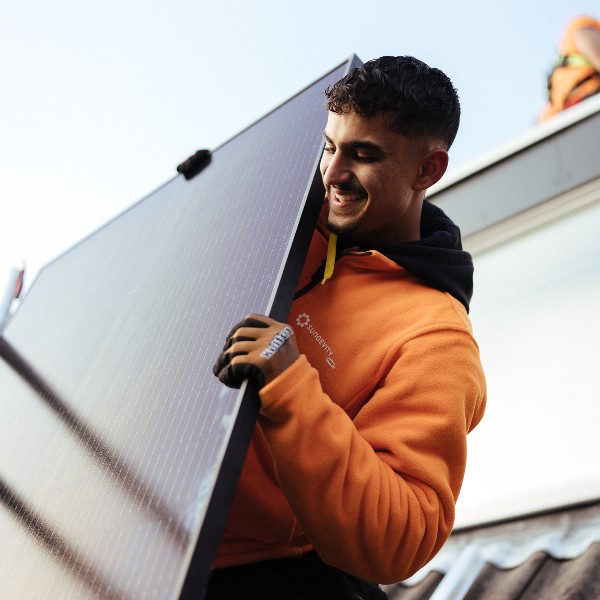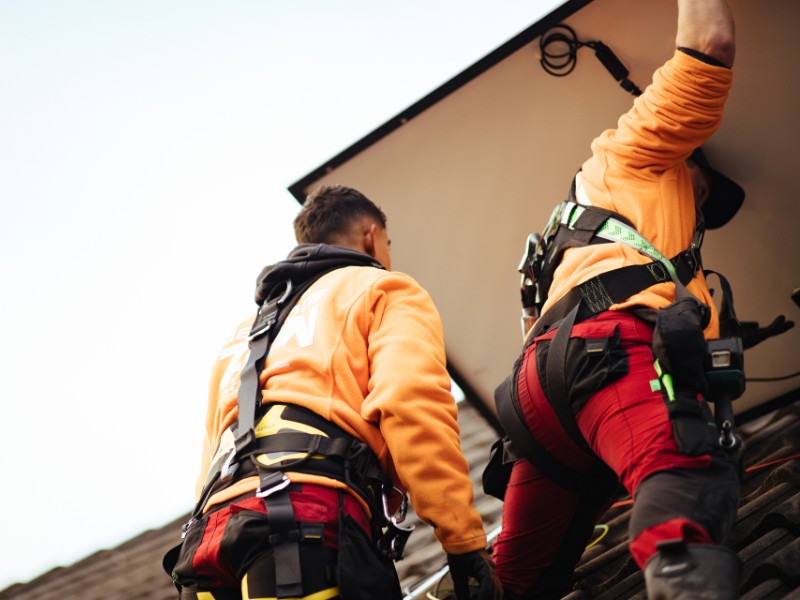Solar panels
Do you want to save money on your electricity bill whilst reducing your carbon footprint? Solar panels help you save money and CO2. Complete our rooftop scan to find out how much your roof is worth – and request a free solar quote.
Free quoteWhy solar panels?
Solar panels are technically at their best and have a payback period of only a few years. But a solar system has many more benefits. For example, did you know that you can sell excess solar electricity that your home doesn’t use back to the grid, or that solar panels will increase your home’s property value?
How do solar panels work?
Solar panels are also known as PV panels or photovoltaic panels. This term refers to what solar panels do: convert sunlight into electricity. To actually run your household on your self-generated solar electricity, we use an inverter. An inverter is a small device that direct current (DC) electricity produced by the solar panels to usable alternating current (AC) electricity. Power flows from the PV system to the inverter(s) and from the inverter(s) to the fuse box, that distributes the power within your home.
GO SOLAR WITH SUNGEVITY
It is our mission to help as many people as possible to go solar. That is why we are happy to offer our free online solar consultation in English and Dutch.
Please note that most other (written) communication will be in Dutch.
What are the best solar panels?
There are lots of different types and brands of solar panels. But how do you choose the right panel? Good quality indicators are the guarantees offered, the amount of sunlight that is converted into electricity, and certificates or quality marks such as Tier 1 and TÜV. Sungevity only offers premium brand solar panels, so you know you’re getting the best quality. We help you choose the best panels for your roof and your budget, because what is ideal for you really depends on several factors.

Which solar panel should I choose?
The type of solar panel you choose has a significant impact on the final costs and your return. When comparing solar panels, focus on what you find important. High power output? Check how much kilowatthours (kWh) the panels can generate. Warranty? Pay attention to the product guaranty and the yield guaranty. Sustainability? Invest in solar panels that are produced in Europe. Our solar experts are happy to help you choose the best solar panels. We listen to your wishes, have a look at your power consumption and, of course, look at your roof.
It’s important to take into account that how much solar energy your roof can generate, does not only depend on the quality of the panels. The size of your roof, the roof orientation and the shadow effect also affect the power generation of the solar panels.
CAREFREE SOLAR
When you buy solar panels from Sungevity, you won’t have to worry about a thing. You get solar panels of the highest quality, a complete warranty package and best-in-class service. We are affiliated with Install-Q (the Dutch quality mark for solar energy) and are active all over the Netherlands.
What do solar panels cost?
Buying solar panels is a smart, but significant investment for your home. How much the solar system ultimately costs you, depends primarily on the number of solar panels and the type of solar panels you choose. This differs per situation. To give you an indication: in 2023, an average system of 12 x 360 Wp solar panels will cost you roughly € 4540 (excl. VAT). Please note that your actual costs may be higher or lower, depending on your individual circumstances and the panels you choose.

More information about solar panels
How to reclaim VAT on solar panels
From 1 January 2023, the VAT for the supply and installation of solar panels has been reduced from 21% to 0%. This means you, as a solar panel owner, no longer have to reclaim the VAT yourself via your VAT return, which saves you time and reduces your administrative burden.
If you had solar panels installed in 2022, you can reclaim the VAT by registering as an entrepreneur and sending in a declaration of solar panel holders’ (formulier ‘Opgaaf zonnepaneelhouders’) to the Dutch tax authorities. Please note that you must reclaim the VAT before July 1th 2023.
Are solar panels profitable?
Solar panels help you save money on your energy bill. Through your monthly savings, you will earn back the investment within a few years.
Example: a solar system of 12 x 360 Wp will cost you roughly €4532. The system produces approx. 3672 kWh per year. The average electricity price in the Netherlands is 40 cents per kilowatt-hour, meaning that your solar panels will help you save (3672 x 0,40 =) € 1468,80 per year . This results in a pay back period of a little over 3 years (€4532 / 1468,80 = 3,1). Solar panels usually last for 25 to 30 years, meaning that you’ll have +20 years of free electricity once your system reaches payback.
Please note that your actual costs may be higher or lower, depending on the type panels you choose, your electricity contract and of course your electricity usage.
Financing solar: how do you pay for solar panels?
Wanna go solar without having invest a lot of money at once? Apply for a green loan to finance the cost of your solar panels.
How many solar panels do I need?
How many solar panels you need to power your home depends on a few factors: your home energy usage, the size and orientation of your roof and how much sunlight your roof gets. More panels isn’t always better when it comes to solar: if your energy consumption is low, there is no need to fill your entire roof with solar panels.
Today, if you generate more power than you immediately use, you sell back the extra energy your solar panels produce to the grid. Your energy supplier levels out the solar energy you put back into the grid against the power you buy from the grid. This is called net metering (‘salderen’). From 2025 onwards, net metering will be phased out gradually, until it stops in 2030. This means that you will receive a much smaller sell-back compensation for the energy you will put back into the grid. By phasing out net metering, solar panel owners are encouraged to use as much of their own electricity as possible.
What is the standard solar panel size?
There is no fixed standard size for solar panels, but the most typical size for residential solar is 170 mm by 100 mm, which is approximately 6.7 by 3.9 inches. The thickness of a solar panel varies between 35 and 50 mm (1.4-1.9 inches).
Lifespan: how long do solar panels last?
Solar panels usually last for at least 25-30 years. Most central inverters last between 10-15 years, meaning that you will have to replace the inverter once during the life of your solar power system. Micro inverters have a life span for over 20 years.
Can I rent or lease solar panels?
Solar panels can be rented or leased, similar to leasing a car or renting an apartment. A big disadvantage of leasing or renting solar panels is that you do not receive tax credits and other incentives that solar panel owners benefit from, and that your property value does not increase since you do not own the solar system. Renting or leasing a solar system also costs you more in the long run, since you never profit from free electricity but continue paying monthly payments through the whole lease period. That is why Sungevity does not lease or rent out solar panels. If you cannot make a large investment at once, we recommend looking into applying for a green loan instead. During our free online solar consultation, our solar consultants can tell you more about financing solar panels with a green loan.
Do solar panels require maintenance?
Solar panels last for years and typically do not require maintenance. In order to maintain the efficiency and productivity of the panels, we do, however, recommend periodic cleaning (once every 1-2 years). Solar panels do not require any special cleaning equipment and can be cleaned with (deionized) water.